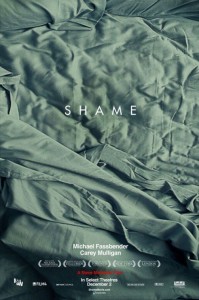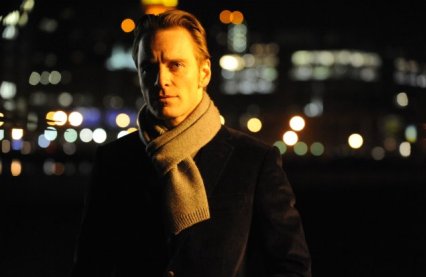
| Release Date: | December 16th, 2011 |
| Starring: | Michael Fassbender, Carey Mulligan, James Badge Dale, Nicole Beharle, Lucy Walters, Mari-Ange Ramirez |
| Writer: | Abi Morgan, Steve McQueen |
| MPAA Rating: | NC-17 |
| Director: | Steve McQueen |
Though The Girl with the Dragon Tattoo has laid claim as “the feel bad movie of Christmas” in its cheeky teaser trailer, that boast may actually belong to British director Steve McQueen’s second feature Shame. A downbeat character study of an emotionally-distant sex addict in New York City, the film has garnered awards and critical praise for Michael Fassbender’s complex and candid performance in his second exploratory collaboration with director McQueen (following the IRA prison drama Hunger). The British filmmakers take on the cold dark nights of an America full of commoditized intimacy (internet sex, prostitutes, and “hookups”) but offering little long-term comfort. The film has garnered an NC-17 rating for some unflinching sexual content which will hopefully not deter the proper audience from experiencing a moving and poetic piece.

Having started his career in the world of painting, McQueen is naturally drawn to the elliptical options of cinema –the way that he can skip over exposition and poetically discover his subject matter. In Hunger we float through the first twenty minutes without a grounded narrative until finally settling upon the focal character Bobby Sands (Fassbender) – a humanistic approach which does not favor one man’s story over countless others. Shame introduces us to Brandon right away, but he remains elusive throughout (even trying to outrun a tracking camera in a stunningly-filmed jog through nocturnal New York). The director and his co-writer Abi Morgan also avoid lumpy clichés at each turn – Brandon’s sexual deviancy is discovered by one of his bosses but the film does not allow for the sermonizing or moralistic drama that so many commercial films would indulge. McQueen wants you to see parts of yourself in Brandon and empathize with his weaknesses and in this effort he could do no better than casting an onscreen personality as engaging as Michael Fassbender (this year alone has seen his diverse CV include Jane Eyre, X-Men: First Class, and a role as pioneering psychologist Carl Jung in A Dangerous Method).
Making matters more complicated is the arrival of Brandon’s soulful, damaged sister Sissy (Carey Mulligan) unnervingly first seen stepping out of the shower and appearing to be another of Brandon’s casual partners. An unspoken trauma has happened to the siblings in their early lives, one which Brandon has suppressed and which has led Sissy to multiple suicide attempts and an unhealthy attachment to her brother. While it sounds almost too unbearably sad, McQueen finds the charm and humanity in the byplay between the two and allows for moments of aching grace like the extended sequence of Sissy performing a forlorn but sensual version of “New York, New York” at a cocktail lounge.
Since it is set in swanky Manhattan apartments, restaurants, and offices, Shame might have come off as a middling, yuppie midlife crisis similar to Stanley Kubrick’s satirical Eyes Wide Shut or some Michael Douglas vehicle, but in McQueen’s hands the story is lifted out of these trappings and given a dignified, introspective air.
Many will likely only want to see Shame for its lurid, controversial qualities and will find it bland and perhaps pretentious between sex scenes, others without this agenda will have discovered a burgeoning directorial talent and the best male actor currently working in cinema. McQueen and Fassbender have already begun plotting their third collaboration and you can be assured that they will continue to create provocative, emotionally fraught work with few boundaries.[box_info]WHERE TO WATCH (powered by JustWatch)
[/box_info]


